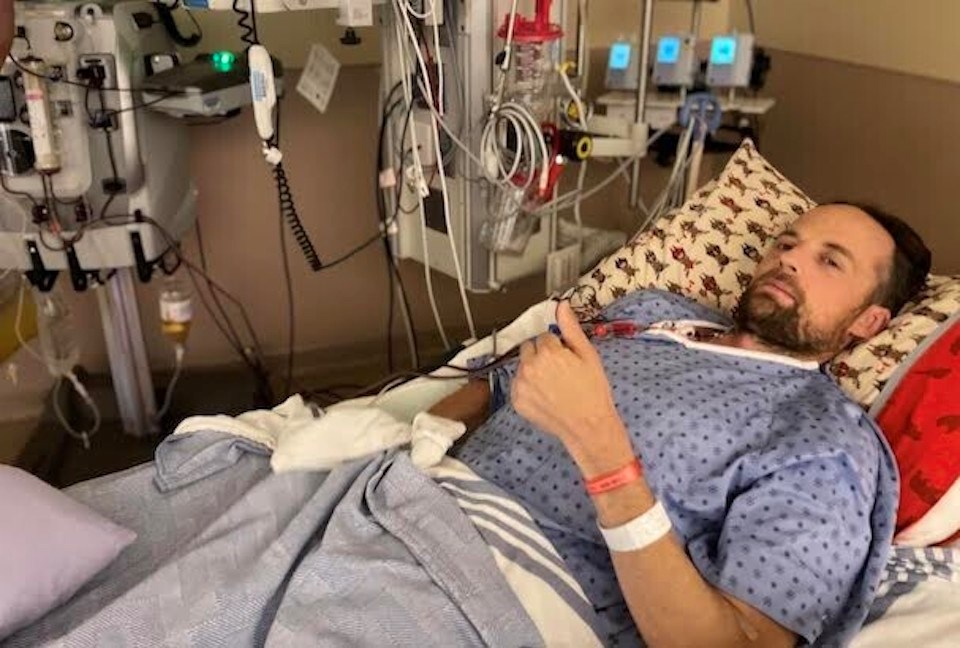An Okanagan man is believed to be amongst the first in Canada to have his vaccine injury certified by the federal government.
Ross Wightman, 40, was temporarily paralyzed and diagnosed with Guillain Barre syndrome about a year ago after receiving his first dose of the AstraZeneca COVID-19 vaccine.
The Lake Country resident did not hesitate to get the vaccine when it became available for him on April 1, 2021. Ten days later, he woke up with extreme back pain. His symptoms would worsen in the days following and he was diagnosed by a neurologist with Guillain Barre — an autoimmune response that affects the nervous system.
Wightman is one of the extraordinarily unlucky people the federal government had in mind when it launched the last year, promising compensation to those with a “serious and permanent” injury from vaccination.
Earlier this month, Wightman received a letter from the program, confirming that a medical review board has found a “probable causal association between the injury(ies) sustained and the vaccination.”
The finding means Wightman, who has been off work since he fell ill, has been approved for compensation — but the money is secondary for him.
“It's validating as to how my injury occurred,” he said, explaining provincial health officials were telling him that the vaccine injury “couldn’t be proven or disproven.”
“It’s nice to have a letter to share with our provincial health officials… three doctors, neurologists, representing the federal government have all agreed on how I've gotten here.”
Wightman says he was told he is the first in Canada to receive a letter like his. The Vaccine Injury Support Program’s most recent statistics includes data up to Nov. 30, 2021, show “fewer than five” of 400 claims approved. The program is set to provide updated numbers by Wednesday.
Wightman says when he started interacting with the federal government about his situation he was told to expect a 12-18 month wait. Communication was initially poor, leading him to in February, and things improved considerably around the same time.
He praised his current federal case manager.
“Things have still been slow, but he's always been there to answer a question or take a phone call. And that's really all you can ask for,” Wightman said.
He also heaped praise on the healthcare workers and physical therapists that have helped him through his recovery. Because he was denied an exemption to the provincial vaccine passport program — provincial health officials insisted he was able to get a second dose — those appointments were among his only social interactions.
“I’m very grateful for everyone at KGH,” he said.
Wightman says his condition is improving slowly through physiotherapy and occupational therapy sessions multiple times a week.
“I'm getting better. It's slow, a very slow process. But every week is better than the previous. Getting stronger, gaining weight, I still have a long way to go,” he said, adding he expects to be dealing with treatment for another year or two.
He is now able to walk but it is easy to grow tired.
“But at least you know, I couldn't walk six months ago, so I'm just happy where I'm at.”
The federal support program provides a lump sum payment for pain and suffering and a loss-of-income component as well. Wightman says the loss-of-income coverage, which is retroactive, will be less than what he was making prior to his injury. Healthcare costs will also be covered, he's been told.
“Money is great. It helps pay bills and put food on the table and therapy and whatnot,” he said. “But I've just lost like a year of my life and maybe more so. It's losing all the time to do stuff with my kids and family, and who knows what price this takes on my body going down the road.”
Severe vaccine injuries remain extraordinarily rare.
The most recent BCCDC , current as of March 19, 2022, shows 416 serious adverse reactions to COVID-19 vaccination on 11.4 million doses administered.
There have been 10 reports in B.C. of individuals hospitalized with Guillain Barre syndrome after vaccination, like Wightman was.
“GBS cases following COVID-19 vaccines have been identified in Canada and internationally, but rarely,” said a BCCDC .
In a statement to Castanet, the Public Health Agency of Canada said the federal government is "committed to ensuring that Canadians who support public health by being vaccinated are supported, should they experience a serious and permanent injury as a result of vaccination."
"Health Canada and PHAC continue to advise that the benefits of vaccination with a vaccine approved in Canada outweigh the potential risk of disease," the statement added.




